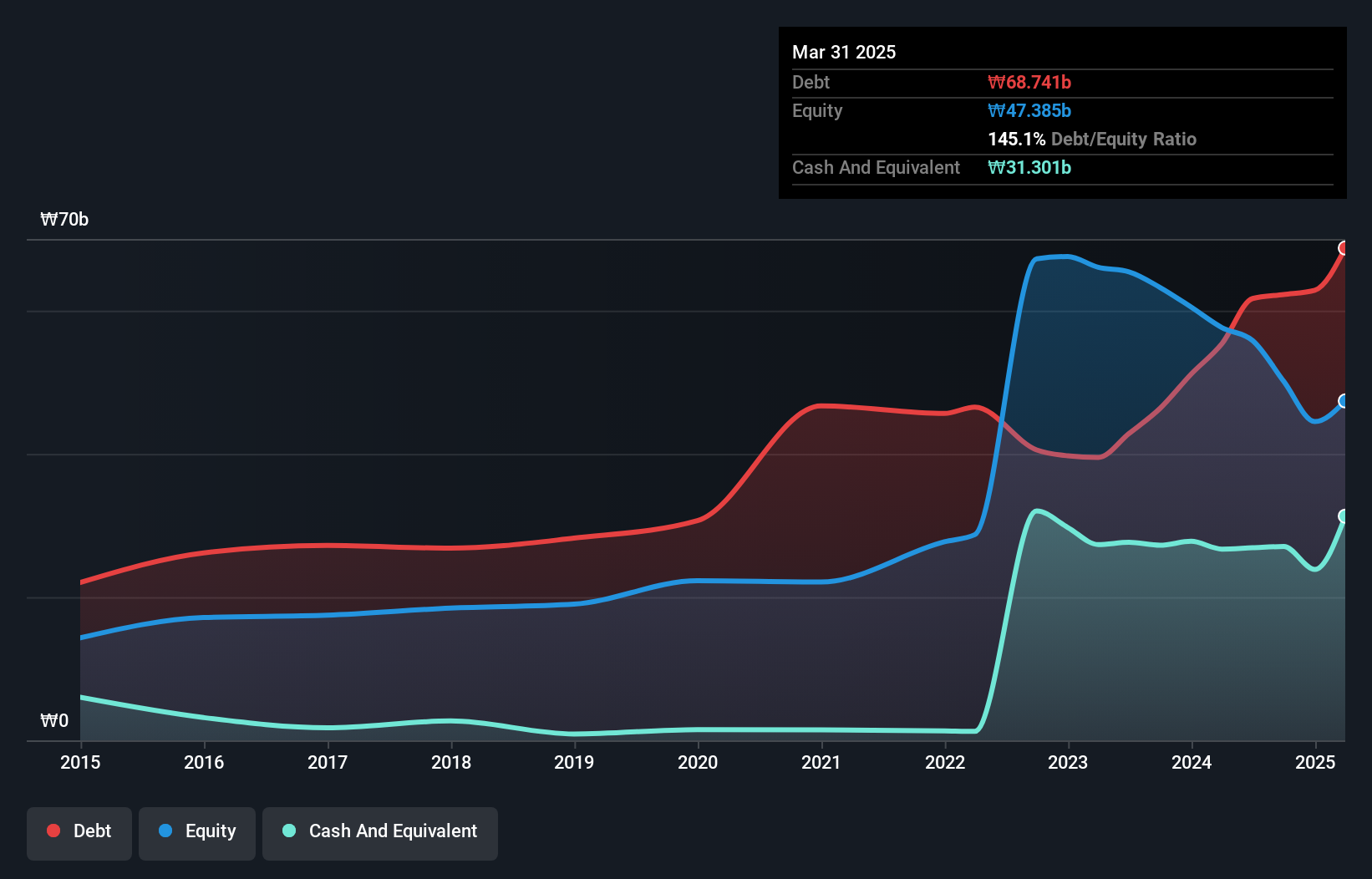David Iben put it well when he said, 'Volatility is not a risk we care about. What we care about is avoiding the permanent loss of capital.' So it might be obvious that you need to consider debt, when you think about how risky any given stock is, because too much debt can sink a company. Importantly, Ycchem Co., Ltd. (KOSDAQ:112290) does carry debt. But the more important question is: how much risk is that debt creating?
When Is Debt A Problem?
Debt assists a business until the business has trouble paying it off, either with new capital or with free cash flow. If things get really bad, the lenders can take control of the business. However, a more frequent (but still costly) occurrence is where a company must issue shares at bargain-basement prices, permanently diluting shareholders, just to shore up its balance sheet. By replacing dilution, though, debt can be an extremely good tool for businesses that need capital to invest in growth at high rates of return. The first thing to do when considering how much debt a business uses is to look at its cash and debt together.
How Much Debt Does Ycchem Carry?
The image below, which you can click on for greater detail, shows that at March 2025 Ycchem had debt of ₩68.7b, up from ₩55.4b in one year. However, it does have ₩31.3b in cash offsetting this, leading to net debt of about ₩37.4b.

How Strong Is Ycchem's Balance Sheet?
Zooming in on the latest balance sheet data, we can see that Ycchem had liabilities of ₩50.2b due within 12 months and liabilities of ₩29.5b due beyond that. Offsetting these obligations, it had cash of ₩31.3b as well as receivables valued at ₩7.59b due within 12 months. So its liabilities outweigh the sum of its cash and (near-term) receivables by ₩40.8b.
Since publicly traded Ycchem shares are worth a total of ₩228.5b, it seems unlikely that this level of liabilities would be a major threat. However, we do think it is worth keeping an eye on its balance sheet strength, as it may change over time. There's no doubt that we learn most about debt from the balance sheet. But ultimately the future profitability of the business will decide if Ycchem can strengthen its balance sheet over time. So if you're focused on the future you can check out this free report showing analyst profit forecasts.
View our latest analysis for Ycchem
In the last year Ycchem wasn't profitable at an EBIT level, but managed to grow its revenue by 19%, to ₩73b. That rate of growth is a bit slow for our taste, but it takes all types to make a world.
Caveat Emptor
Over the last twelve months Ycchem produced an earnings before interest and tax (EBIT) loss. To be specific the EBIT loss came in at ₩6.8b. Considering that alongside the liabilities mentioned above does not give us much confidence that company should be using so much debt. Quite frankly we think the balance sheet is far from match-fit, although it could be improved with time. Another cause for caution is that is bled ₩12b in negative free cash flow over the last twelve months. So in short it's a really risky stock. When we look at a riskier company, we like to check how their profits (or losses) are trending over time. Today, we're providing readers this interactive graph showing how Ycchem's profit, revenue, and operating cashflow have changed over the last few years.
When all is said and done, sometimes its easier to focus on companies that don't even need debt. Readers can access a list of growth stocks with zero net debt 100% free, right now.
New: Manage All Your Stock Portfolios in One Place
We've created the ultimate portfolio companion for stock investors, and it's free.
• Connect an unlimited number of Portfolios and see your total in one currency
• Be alerted to new Warning Signs or Risks via email or mobile
• Track the Fair Value of your stocks
Have feedback on this article? Concerned about the content? Get in touch with us directly. Alternatively, email editorial-team (at) simplywallst.com.
This article by Simply Wall St is general in nature. We provide commentary based on historical data and analyst forecasts only using an unbiased methodology and our articles are not intended to be financial advice. It does not constitute a recommendation to buy or sell any stock, and does not take account of your objectives, or your financial situation. We aim to bring you long-term focused analysis driven by fundamental data. Note that our analysis may not factor in the latest price-sensitive company announcements or qualitative material. Simply Wall St has no position in any stocks mentioned.
About KOSDAQ:A112290
Ycchem
Researches, develops, produces, and sells chemical materials in China.
Exceptional growth potential with mediocre balance sheet.
Market Insights
Community Narratives


